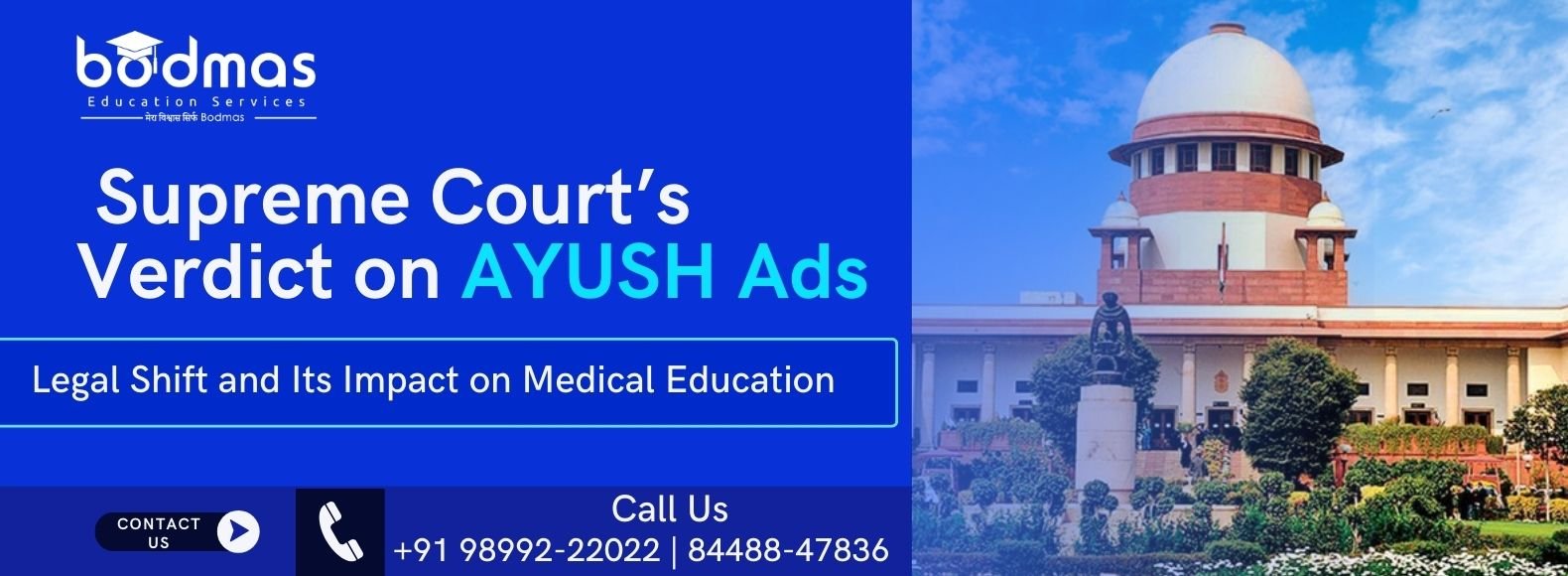Supreme Court’s Verdict on AYUSH Ads: Legal Shift and Its Impact on Medical Education
A landmark verdict, which may not only have an impact upon the health care sector but also on the architecture of medical education, was delivered on August 11, 2025, by the Supreme Court of India. The court dismissed a petition filed by the Indian Medical Association (IMA) against Patanjali Ayurved and also supported the centre’s decision to remove Rule 170 of the Drugs and Cosmetics Rules, 1945.
AYUSH (Ayurveda, Yoga & Naturopathy, Unani, Siddha and Homoeopathy) products were under the scope of the rule that seeks to take pre-approval from state licensing authority before mandatorily advertising. Now since its withdrawal too, the companies are given a free hand to market AYUSH products without state-level observations.
Why Was the Case Filed?
The feud dates back to 2022 when the IMA had accused Patanjali of running commercials which reportedly defamed allopathic medicine and claimed cures for chronic ailments like diabetes, hypertension and asthma without evidence.
First, the AYUSH Ministry brought in Rule 170 to restrict such ads. But the power ministry repealed the order in July 2024, nullifying the precondition. The Supreme Court put a temporary stay to this removal and asked Patanjali to take down misleading ads and apologize publicly. These apologies were then modified after coming to be seen as insufficient.
What Did the Supreme Court Say?
On August 11, 2025, a bench headed by Justices K.V. Viswanathan and B.V. Nagarathna said the reliefs sought by IMA had already been responded to. “If a key regulation is swept aside, it cannot be brought back by judicial decree,” the court stated.
Justice Viswanathan asked how states can invoke a rule that has been struck down at the central level, and Justice Nagarathna said that the judiciary cannot put back a deleted rule. The court dismissed the petition, set aside the stay on Rule 170 and decided to close the contempt case against Patanjali. But it made clear that parties can go to other forums if fresh legal issues crop up.
👉 Your next big insight? On our LinkedIn
Why This Judgment Matters Beyond Advertising
The ruling has far-reaching implications:
1. Greater Freedom for AYUSH Advertising
Now, AYUSH companies can advertise products without having to seek prior approval from the state since rule 170 has been done away. While this streamlining makes marketing simpler, it also leads to the potential of deceptive claims when not properly regulated.
2. Consumer Awareness Becomes Critical
In the absence of pre-approval checks, consumers might have to put a premium on media literacy and fact-checking in order to avoid becoming the target audience of overly inflated promises.
3. Accountability Shifts to Brands
The Supreme Court cautioned that companies found airing “misleading advertisements” may face ruinous repercussions for brands, advertisers and even famous figures who endorsed the products.
4. Industry Precedent for Self-Regulation
Such a ruling heralds an equilibrium in the area of commercial freedom versus moral responsibility. AYUSH players need to be self-regulatory or they should be legally forced.
👉 Scroll smarter! Follow us on Instagram
How Does This Impact Medical Education?
Medical education in India is not just about clinical skills; it is about ethics, evidence based practice and patient safety. This decision takes on a new dimension for medical students and instructors:
Ethics in Advertising and Practice
Awareness of the ethical limits to healthcare communication, misinformation campaigns and unfounded medical claims must be explained to registrars who become future doctors. This clinical case can be used as a case study in medical ethics teaching programmes.
👉 Stay updated in real-time—join us on WhatsApp
Combining AYUSH Wisdom with Evidence-Based Medicine
As AYUSH is getting more visibility, we need to give shape to medical students with right orientation of respecting traditional systems but also applying scientific validation. This provides a "window of opportunity" in integrative medicine curricula.
Public Health Education
Physicians are major decision-makers in patient counseling. Medical education should therefore now focus on essential appraisal skills in ensuring that future doctors can steer patients away from such claims.
Legal and Regulatory Awareness
The importance of knowledge of drug control, advertisement and consumer rights as a 21st century doctor. This judgment brings out the reason why LL should be taught to postgraduate & public health.
👉 Join our Telegram community and never miss an update…
Final Thoughts
The Supreme Court’s dismissal of the IMA petition and its decision to uphold the scrapping of Rule 170 is much more than a legal judgment—it’s a game change in healthcare communication. It is also for the medical education system to further augment training in ethics, evidence-based practice, and regulatory literacy.
As medicine changes, the doctors of tomorrow can no longer just identify diseases; they must also fight pseudoscience, protect patient welfare, and defend the profession from the growing intrusion of big-business advertising into treatment decisions.
Powered by Froala Editor





